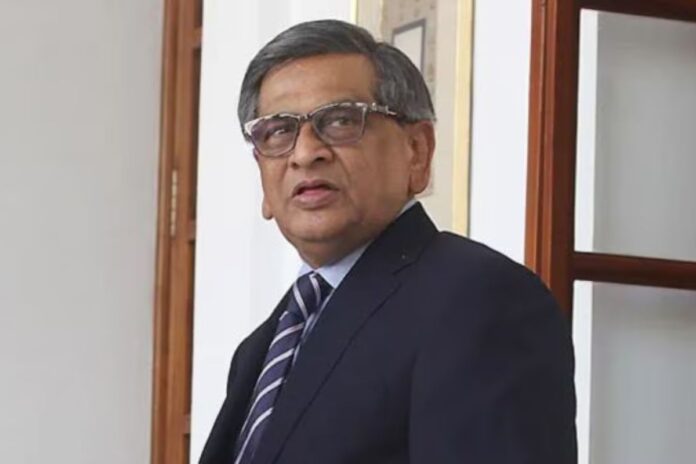S.M. Krishna, the celebrated former Karnataka Chief Minister who played a pivotal role in transforming Bengaluru into a global technology hub, passed away in the early hours of Tuesday. He was 92. Krishna, a stalwart of Indian politics with a career spanning nearly six decades, succumbed to age-related ailments around 2:30-2:45 a.m., according to family sources.
Renowned as the “Architect of Brand Bengaluru,” Krishna’s tenure as Karnataka’s Chief Minister (1999-2004) witnessed a remarkable metamorphosis of Bengaluru into India’s “Silicon Valley.” His visionary leadership fostered infrastructure development and provided incentives to the IT and BT sectors, propelling the city onto the global map.
Prime Minister Narendra Modi mourned Krishna’s demise, describing him as “a remarkable leader, admired by people from all walks of life.” In a heartfelt tribute posted on X, Modi remarked, “He always worked tirelessly to improve the lives of others. He is fondly remembered for his tenure as Karnataka’s Chief Minister, particularly for his focus on infrastructural development.” The Prime Minister added, “I have had many opportunities to interact with Shri S.M. Krishna Ji over the years, and I will always cherish those interactions. My condolences to his family and admirers. Om Shanti.”
Karnataka Chief Minister Siddaramaiah lauded Krishna’s unparalleled contributions to the state, particularly in revolutionizing the IT-BT sector. “His visionary leadership has left an indelible mark on Karnataka. We will forever remain indebted to him,” Siddaramaiah said in a condolence message on X. He also recalled Krishna as “a guide and mentor” during his early political days.
Karnataka Deputy Chief Minister D.K. Shivakumar, who is also a relative of Krishna, announced that the final rites will take place on Wednesday in Somanahalli village, Mandya district. A Padma Vibhushan awardee and a Fulbright scholar, Krishna hailed from Maddur taluk in Mandya district, belonging to the Vokkaliga community of the Old Mysuru region.
A Storied Political Career
Born on May 1, 1932, S.M. Krishna began his political journey in the 1960s, winning the Maddur Assembly seat as an Independent candidate. He later joined the Praja Socialist Party and then the Congress, where he carved out a legacy of leadership at both state and national levels. Krishna served as an MLA, MLC, and as a member of both Lok Sabha and Rajya Sabha multiple times. His tenure in various high-ranking roles, including commerce and industries minister in the Devaraj Urs cabinet (1972-77), governor of Maharashtra, and external affairs minister during UPA-2 (2009-2012), underscored his versatile political acumen.
As the Karnataka Pradesh Congress Committee (KPCC) president, Krishna led the Congress to victory in the 1999 Assembly elections and assumed the Chief Minister’s office. During this period, his ambitious initiatives, such as the “Panchajanya Yatra” ahead of the elections, cemented his reputation as a dynamic and innovative leader.
Legacy as Chief Minister
Krishna’s tenure as Chief Minister marked a turning point in Karnataka’s history. Under his leadership, Bengaluru emerged as a global IT powerhouse. He inaugurated the city’s first flyover and provided special facilities to attract IT and BT companies, laying the groundwork for the city’s economic transformation.
However, his tenure was not without controversies. The Abdul Karim Telgi stamp paper scam, land scams, mismanagement during Kannada film icon Rajkumar’s abduction by forest brigand Veerappan, and the Cauvery water dispute with Tamil Nadu marred his administration. Critics labeled him the “Chief Minister of Bengaluru,” accusing him of neglecting rural Karnataka.
Despite these challenges, Krishna’s contributions to Bengaluru’s rise as a tech hub overshadowed the controversies. His policies and infrastructural initiatives earned him widespread admiration, and his role in shaping Bengaluru’s modern identity remains a cornerstone of his legacy.
Later Years and Move to BJP
Post his tenure as Chief Minister, Krishna was appointed Governor of Maharashtra in 2004 by the Congress-led UPA government. Keen to return to active politics, he was later elected to the Rajya Sabha and served as external affairs minister from 2009 to 2012. His stint in the foreign ministry was marked by his emphasis on strengthening India’s global diplomatic ties.
Krishna’s influence in the Congress waned over the years, leading to a decline in his political standing. In 2017, at the age of 84, he made a significant move by joining the Bharatiya Janata Party (BJP), citing disillusionment with the Congress. “The Congress badly bruised my self-respect and honor,” he said, adding that the party had shifted its focus from nurturing leaders to managing affairs.
Despite his switch to the BJP, Krishna’s advancing age and the tragic suicide of his son-in-law, Café Coffee Day founder V.G. Siddhartha, in 2019, impacted his active involvement in politics. In January 2023, he officially announced his retirement from active political life.
Remembering a Statesman
Leaders across political lines remembered Krishna as a statesman who left an indelible mark on Karnataka and Indian politics. His foresight, discipline, and mentorship inspired generations of politicians. For many, he was not just a politician but a visionary who transformed Bengaluru and contributed to India’s IT revolution.
As tributes pour in, the nation mourns the loss of a leader whose vision and leadership reshaped Karnataka’s socio-economic landscape. S.M. Krishna’s demise marks the end of an era, but his legacy will continue to inspire and guide future generations.

